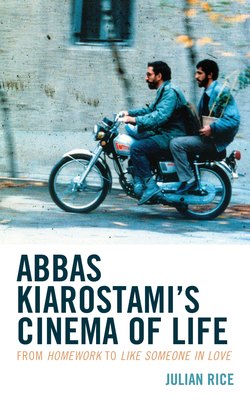Читать книгу Abbas Kiarostami's Cinema of Life - Julian Rice - Страница 9
На сайте Литреса книга снята с продажи.
Notes
Оглавление1.
Quoted in Andrew Pulver and Saeed Kamali Dehgha, “Abbas Kiarostami, Palme d’Or-Winning Iranian Film-Maker, Dies Aged 76,” Guardian, July 4, 2016, https://www.theguardian.com/film/2016/jul/04/abbas-kiarostami-palme-dor-winning-iranian-film-maker-dies.
2.
Ahmad Karimi Hakkak and Michael Beard, introduction to Abbas Kiarostami, Walking with the Wind, bilingual ed., trans. Ahmad Karimi Hakkak and Michael Beard (Cambridge, MA: Harvard University Film Archive, 2001), para. 15.
3.
Quoted in Stuart Jeffries, “Landscapes of the Mind,” Guardian, April 16, 2005, https://www.theguardian.com/film/2005/apr/16/art.
4.
Quoted in Deborah Solomon, “Tales from Teheran,” New York Times Magazine, March 11, 2007.
5.
Quoted in Geoff Andrew, “Unspoken Truths,” Sight & Sound (July 2013): 40–43.
6.
Abbas Kiarostami, “With the Wind,” in In the Shadow of Trees: The Collected Poetry of Abbas Kiarostami, trans. Iman Tavassoly and Paul Cronin (New York: Sticking Place Books, 2016), 62.
7.
Kiarostami, “With the Wind,” 69–70.
8.
Omar Khayyam, Rubaiyat of Omar Khayyam, trans. Edward Fitzgerald (1859, 1889), Project Gutenberg, July 10, 2008, http://www.gutenberg.org/cache/epub/246/pg246.txt.
9.
Quoted by Alberto Elena, The Cinema of Abbas Kiarostami, trans. Belinda Coombes (London: SAQI Iran Heritage Foundation, 2005), 130.
10.
Hamid Dabashi, The World of Persian Literary Humanism (Cambridge, MA: Harvard University Press, 2012), 120.
11.
Khayyam, Rubaiyat.
12.
Khayyam, Rubaiyat.
13.
Abbas Kiarostami, “In Dialogue with Kiarostami,” interview by Ali Akbar Mahdi, Iranian, August 25, 1998, https://asianart.fandom.com/wiki/Interviews_with_Abbas_Kiarostami.
14.
Quoted in Elena, Cinema of Abbas Kiarostamii, 78.
15.
Khayyam, Rubaiyat.
16.
Farid Ud-Din Attar, The Conference of the Birds, trans. Afkham Darbandi and Dick Davis (London: Penguin, 1984); “not difficult to see why” in online introduction only, http://thekingdomwithin.net/wpcontent/uploads/2015/03/The_Conference_of_the_Birds_Fardiuddin_Attar.pdf.
17.
Attar, Conference of the Birds, 181, 186.
18.
Attar, Conference of the Birds, 94.
19.
Attar, Conference of the Birds, 157.
20.
Jelaluddin Rumi, The Essential Rumi, trans. Coleman Barks, with John Moyne, A. J. Arberry, and Keynold Nicholson (San Francisco: HarperCollins, 1995).
21.
Quoted in Rozina Ali, “The Erasure of Islam from the Poetry of Rumi,” New Yorker, January 5, 2017, http://www.newyorker.com/books/page-turner/the-erasure-of-islam-from-the-poetry-of-rumi.
22.
Kiarostami, “In Dialogue”; see also Ten on Ten, special feature on Ten, directed by Abbas Kiarostami (2002; New York: Zeitgeist Films, 2004), DVD.
23.
Paraphrased by Elena, Cinema of Abbas Kiarostami, 158.
24.
Quoted in Ali, “Erasure of Islam.”
25.
Quoted in Ali, “Erasure of Islam.”
26.
Quoted in Elena, Cinema of Abbas Kiarostami, 186.
27.
Hakkak and Beard, introduction, para. 12.
28.
Quoted in Jane Ciabattari, “Why Is Rumi the Best-Selling Poet in the US?” BBC Culture, October 21, 2014, http://www.bbc.com/culture/story/20140414-americas-best-selling-poet.
29.
“Rumi,” Wikipedia, updated January 2, 2020, https://en.wikipedia.org/wiki/Rumi.
30.
Rumi, Essential Rumi, 32.
31.
Abbas Kiarostami, “With Borrowed Eyes: An Interview with Abbas Kiarostami,” interview by David Sterritt, Film Comment, July–August 2000, http://www.filmcomment.com/article/with-borrowed-eyes-an-interview-with-abbas-kiarostami/.
32.
Rumi, Essential Rumi, 37.
33.
Rumi, Essential Rumi, 41.
34.
Rumi, Essential Rumi, 96.
35.
See Mahmoud Reza Sani, Men at Work: Cinematic Lessons from Abbas Kiarostami, trans. Alireza Lalehfar (Los Angeles: Mhughes Press, 2013), 99–100.
36.
On the difference between a prophet and a saint, see William C. Chittick, The Sufi Path of Love: The Spiritual Teachings of Rumi (Albany: State University of New York Press, 1983), 119.
37.
Chittick, Sufi Path, 120.
38.
Dabashi, Persian Literary Humanism, 10.
39.
Kiarostami, “With Borrowed Eyes.”
40.
Ten on Ten.
41.
Kiarostami, “With Borrowed Eyes.”
42.
Kiarostami, “With the Wind,” 52.
43.
Kiarostami, “With Borrowed Eyes.”
44.
Elena, Cinema of Abbas Kiarostami, 72.
45.
Kiarostami, interview, in Mehrnaz Saeed-Vafa and Jonathan Rosenbaum, Abbas Kiarostami (Urbana: University of Illinois Press, 2003), 114.
46.
Jalal ad-Din Muhammad Rumi, “Departure,” trans. R. A. Nicholson in Persian Poems: Anthology of Verse Translations, ed. A. J. Arberry (London: Everyman’s Library, 1972), http://www.khamush.com/poems.html.
47.
Kiarostami quoted by Alberto Elena, The Cinema of Abbas Kiarostami, trans. Belinda Coombes (London: SAQI Iran Heritage Foundation, 2005), 75.
48.
Quoted in Elena, Cinema of Abbas Kiarostami, 75.
49.
Elena, Cinema of Abbas Kiarostami, 73.
50.
Quoted in Elena, Cinema of Abbas Kiarostami, 73–74.
51.
Quoted in Elena, Cinema of Abbas Kiarostami, 96.
52.
See “Abbas Kiarostami: Doors without Keys,” Curious Creature, 2019, https://www.thecuriouscreature.com/2015/11/20/doors-without-keys/; and Amanda DelaCruz, “Doors without Keys by Abbas Kiarostami at Toronto’s Aga Khan Museum @AgaKhan Museum,” Culture Toronto, November 22, 2015, http://www.culturetoronto.com/spotlight/doors-without-keys-by-abbas-kiarostami#.WFQeRWPu1jo.
53.
Kiarostami, “With Borrowed Eyes.”
54.
See Elena, Cinema of Abbas Kiarostami, 104–5.
55.
See Arthur J. Arberry, introduction to Discourses of Rumi, by Jalal al Din Rumi, trans. Arthur J. Arberry (1947; Richard, UK: Curzon Press, 1993), para. 11–14.
